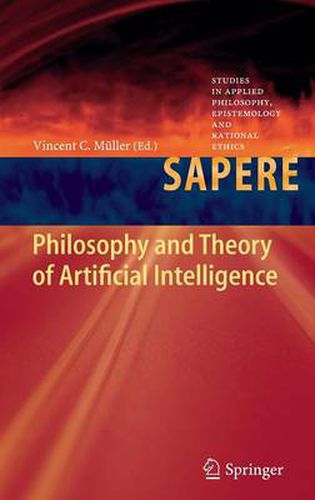Readings Newsletter
Become a Readings Member to make your shopping experience even easier.
Sign in or sign up for free!
You’re not far away from qualifying for FREE standard shipping within Australia
You’ve qualified for FREE standard shipping within Australia
The cart is loading…






This title is printed to order. This book may have been self-published. If so, we cannot guarantee the quality of the content. In the main most books will have gone through the editing process however some may not. We therefore suggest that you be aware of this before ordering this book. If in doubt check either the author or publisher’s details as we are unable to accept any returns unless they are faulty. Please contact us if you have any questions.
Can we make machines that think and act like humans or other natural intelligent agents? The answer to this question depends on how we see ourselves and how we see the machines in question. Classical AI and cognitive science had claimed that cognition is computation, and can thus be reproduced on other computing machines, possibly surpassing the abilities of human intelligence. This consensus has now come under threat and the agenda for the philosophy and theory of AI must be set anew, re-defining the relation between AI and Cognitive Science.
We can re-claim the original vision of general AI from the technical AI disciplines; we can reject classical cognitive science and replace it with a new theory (e.g. embodied); or we can try to find new ways to approach AI, for example from neuroscience or from systems theory. To do this, we must go back to the basic questions on computing, cognition and ethics for AI. The 30 papers in this volume provide cutting-edge work from leading researchers that define where we stand and where we should go from here.
$9.00 standard shipping within Australia
FREE standard shipping within Australia for orders over $100.00
Express & International shipping calculated at checkout
This title is printed to order. This book may have been self-published. If so, we cannot guarantee the quality of the content. In the main most books will have gone through the editing process however some may not. We therefore suggest that you be aware of this before ordering this book. If in doubt check either the author or publisher’s details as we are unable to accept any returns unless they are faulty. Please contact us if you have any questions.
Can we make machines that think and act like humans or other natural intelligent agents? The answer to this question depends on how we see ourselves and how we see the machines in question. Classical AI and cognitive science had claimed that cognition is computation, and can thus be reproduced on other computing machines, possibly surpassing the abilities of human intelligence. This consensus has now come under threat and the agenda for the philosophy and theory of AI must be set anew, re-defining the relation between AI and Cognitive Science.
We can re-claim the original vision of general AI from the technical AI disciplines; we can reject classical cognitive science and replace it with a new theory (e.g. embodied); or we can try to find new ways to approach AI, for example from neuroscience or from systems theory. To do this, we must go back to the basic questions on computing, cognition and ethics for AI. The 30 papers in this volume provide cutting-edge work from leading researchers that define where we stand and where we should go from here.